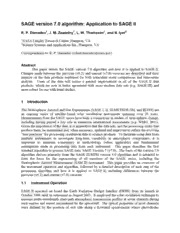
NASA Technical Reports Server (NTRS) 20140006173: SAGE Version 7.0 Algorithm: Application to SAGE II PDF
Preview NASA Technical Reports Server (NTRS) 20140006173: SAGE Version 7.0 Algorithm: Application to SAGE II
SAGE version 7.0 algorithm: Application to SAGE II R. P. Damadeoi, J. M. Zawodny\ L. W. Thomason\ and N. lyer2 iNASA Langley Research Center, Hampton, VA 2Science Systems and Applications Inc., Hampton, VA Correspondence to: R. P. Damadeo ([email protected]) Abstract This paper details the SAGE version 7.0 algorithm and how it is applied to SAGE II. Changes made between the previous (v6.2) and current (v7.0) versions are described and their impacts Oll the data products explained for both coincident event comparisons and time-series analysis. Users of the data will notice a general improvement in all of the SAGE II data products, which are now in better agreement with more modem data sets (e.g. SAGE III) and more robust for use with trend studies. 1 Introduction The Stratospheric Aerosol and Gas Experiments (SAGE I, II, IIIlMETEOR-3M, and III/ISS) are an ongoing series of satellite-based solar occultation instruments spmming over 26 years. Measurements from the SAGE series have been a cornerstone in studies of stratospheric chmlge, including having played a key role in munerous international assessments (e.g. WMO, 2011). Given the importance of the data, it is imperative that the data sets, and the processing codes that produce them, be maintained and, when necessary, updated and improved to reflect the evolving "best practices" for processing occultation data to science products. To facilitate using data from multiple instruments to investigate long-tenn variability in atmospheric components, it is imp0l1ant to maintain consistency in methodology (when applicable) and fundamental assumptions made in processing data from each instnunent. This paper describes the first standard algorithm to process SAGE data, SAGE Version 7 (v7.0). The basis of the version 7.0 algorithm derives primarily [rom the SAGE IIIIM3M version 4.0 algorithm and is intended to Conn the basis for the reprocessing of all members of the SAGE series, including the Stratospheric Aerosol Measurement (SAM II) instrument. This paper provides an overview of the instnunent operation and algorithm, followed by a detailed description of each step of the processing algorithm mId how it is applied to SAGE II, including differences between the previous (v6.2) and CWTent (v7.0) versions. 1.1 Instrument Operation SAGE II operated on board the Earth Radiation Budget Satellite (ERES) from its launch in October 1984 until its retirement in August 2005. It employed the solar occultation teclmique to measure multi-wavelength slant-path atmospheric trmlsmission profiles at seven chmmels during each slUlfise mId sunset encountered by the spacecraft. The optical propel1ies of most channels were defined by the position of exit slits along a Rowland spectrometer where photodiodes
